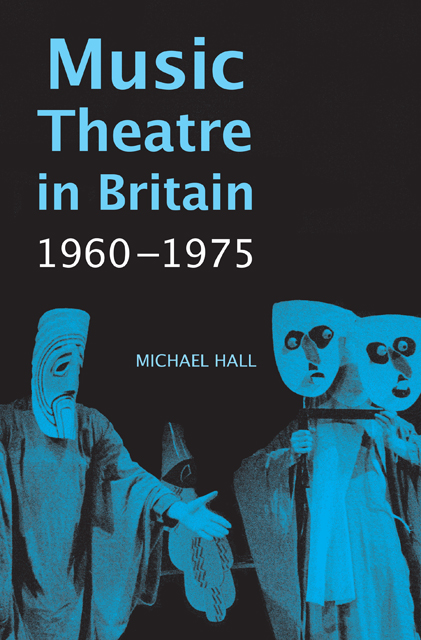1 - Definitions and Overview
Published online by Cambridge University Press: 23 February 2023
Summary
This book discusses the Music Theatre composed mainly by British composers during the 1960s and 1970s. By Music Theatre I mean in essence, to quote the 2009 Concise English Oxford Dictionary, ‘a combination of music and drama in a modern form distinct from traditional opera, typically for a small number of performers’. However, this is only one of the meanings the term has had and its gradual emergence as a distinct genre is worth exploring.
It was certainly used in the nineteenth century in America as an abbreviation of musical theatre, a generic term for popular forms of musical entertainment such as the minstrel show, vaudeville and, after 1895, the music comedy or musical. In the early 1950s, a theatrical licensing agency specialising in Broadway and West End musicals began calling itself ‘Music Theatre International’. More recently, however, the term has veered away from popular music towards opera. Philip Glass’s book, Opera on the Beach, about his operas Einstein on the Beach, Satyagraha and Akhnaten, has as its subtitle, Philip Glass on his New World of Music Theatre.
In Europe, it was used by Walter Felsenstein in the 1950s ‘to designate a theatrical work (or performance) in which dramatic and musical elements are used so as to melt into one another and to create the total impression of “seamless unity”’, but it only came into general use in the 1960s. There is, for example, no entry for Music Theatre in the 1954 edition of The Grove Dictionary of Music and Musicians, but there is in the following edition, The New Grove of 1980. By then the heyday of Music Theatre had been over for several years, but the contributor, Andrew Porter, a London music critic with a special interest in opera, still could not really see it as being ‘distinct from traditional opera’. For him the term is ‘a catch-phrase that became common in the 1960s, particularly among composers, producers and critics who had artistic or social objections to the cost of traditional grand opera and the conservatism of grand opera companies and their audiences’.
- Type
- Chapter
- Information
- Music Theatre in Britain, 1960–1975 , pp. 3 - 20Publisher: Boydell & BrewerPrint publication year: 2015



